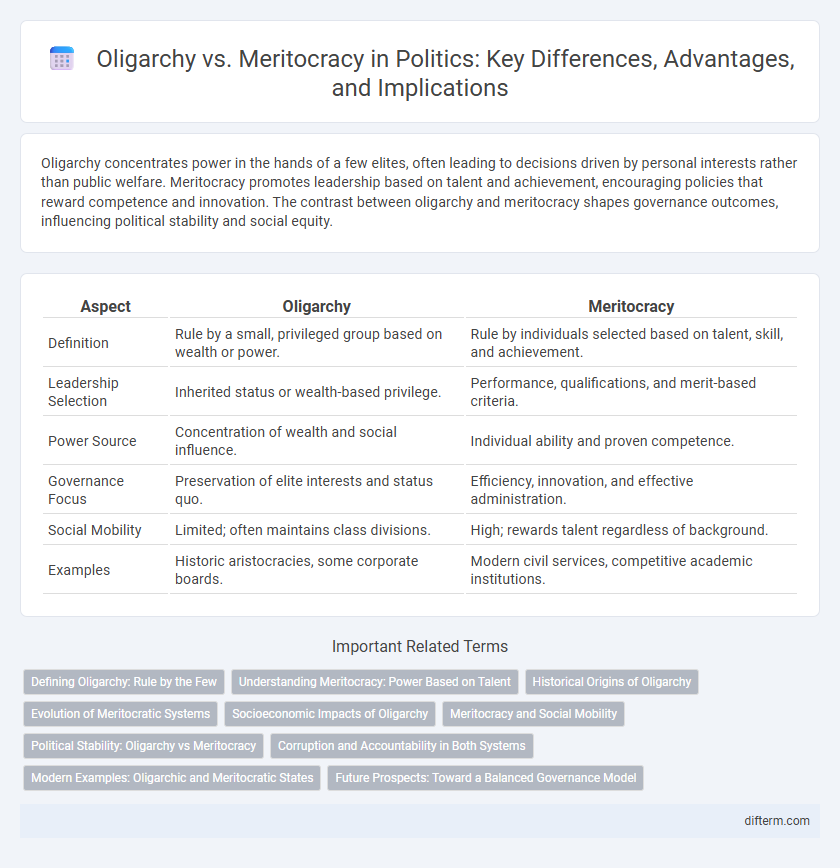Oligarchy concentrates power in the hands of a few elites, often leading to decisions driven by personal interests rather than public welfare. Meritocracy promotes leadership based on talent and achievement, encouraging policies that reward competence and innovation. The contrast between oligarchy and meritocracy shapes governance outcomes, influencing political stability and social equity.
Table of Comparison
| Aspect | Oligarchy | Meritocracy |
|---|---|---|
| Definition | Rule by a small, privileged group based on wealth or power. | Rule by individuals selected based on talent, skill, and achievement. |
| Leadership Selection | Inherited status or wealth-based privilege. | Performance, qualifications, and merit-based criteria. |
| Power Source | Concentration of wealth and social influence. | Individual ability and proven competence. |
| Governance Focus | Preservation of elite interests and status quo. | Efficiency, innovation, and effective administration. |
| Social Mobility | Limited; often maintains class divisions. | High; rewards talent regardless of background. |
| Examples | Historic aristocracies, some corporate boards. | Modern civil services, competitive academic institutions. |
Defining Oligarchy: Rule by the Few
Oligarchy is a political system where power is concentrated in the hands of a small, privileged group, often defined by wealth, family ties, or military control. Unlike meritocracy, where leadership is based on talent and achievement, oligarchy prioritizes inherited status or exclusive influence. This concentration of authority can limit political participation and undermine democratic principles by restricting decision-making to an elite minority.
Understanding Meritocracy: Power Based on Talent
Meritocracy allocates political power based on individual talent, skills, and achievements rather than wealth or social status, promoting effective governance and innovation. This system emphasizes education, performance, and qualifications, enabling leaders to make decisions grounded in expertise and competence. Unlike oligarchy, where power is concentrated among a few elites, meritocracy fosters broader participation and accountability by rewarding merit over inherited privilege.
Historical Origins of Oligarchy
Oligarchy originated in ancient Greece, notably in the city-state of Sparta, where political power was concentrated in the hands of a few wealthy and noble families. This governance model emphasized elite control based on birthright and wealth rather than individual merit, contrasting sharply with the later development of meritocracy in Confucian China, which promoted leadership based on talent and education. The historical roots of oligarchy highlight a system where social hierarchy and exclusive power dynamics prevailed over merit-based political participation.
Evolution of Meritocratic Systems
Meritocratic systems have evolved through the integration of competitive examinations, transparent recruitment processes, and performance-based evaluations to promote efficiency and social mobility within political institutions. Unlike oligarchies where power is concentrated among a few elites, meritocracies emphasize skill, education, and achievement as criteria for leadership roles, fostering a more dynamic and accountable governance structure. Contemporary meritocratic governance increasingly incorporates digital technologies and data-driven decision-making to enhance objectivity and reduce nepotism in political appointments.
Socioeconomic Impacts of Oligarchy
Oligarchy concentrates political power and wealth in the hands of a few, leading to increased income inequality and limited social mobility. This concentration often results in policies favoring elite interests, marginalizing the broader population and exacerbating poverty rates. Economic stagnation and reduced innovation frequently emerge as systemic barriers undermine meritocratic advancement and equitable resource distribution.
Meritocracy and Social Mobility
Meritocracy promotes social mobility by rewarding individuals based on talent, effort, and achievements rather than wealth or social status, creating a more equitable political system. In contrast to oligarchy, where power is concentrated in a few elites, meritocratic governance enables diverse participation and fosters innovation within political institutions. Empirical studies show that countries with meritocratic principles tend to have higher levels of social trust and economic development.
Political Stability: Oligarchy vs Meritocracy
Oligarchies often experience political stability through concentrated power among a few elite individuals, which can suppress dissent but risks social unrest if inequality intensifies. Meritocracies promote political stability by fostering governance based on competence and public trust, reducing corruption and encouraging inclusive policymaking. Empirical data suggests meritocratic systems correlate with higher long-term political stability due to institutional transparency and accountability.
Corruption and Accountability in Both Systems
Oligarchies often struggle with corruption due to concentrated power among a few elites, reducing transparency and accountability mechanisms. Meritocracies enhance accountability by promoting leaders based on skills and performance, which tends to minimize nepotism and misuse of power. However, even meritocratic systems require strong institutional checks to prevent corruption from emerging within bureaucratic hierarchies.
Modern Examples: Oligarchic and Meritocratic States
Modern oligarchic states, such as Russia, concentrate political power among wealthy elites who influence policymaking through economic dominance and control over media. In contrast, meritocratic states like Singapore emphasize talent-based governance, promoting leaders through education and performance metrics to ensure efficient administration. These contrasting systems highlight the impact of power distribution methods on political stability and policy effectiveness.
Future Prospects: Toward a Balanced Governance Model
Future governance models may integrate meritocratic principles to ensure competent leadership with oligarchic elements that preserve stability through established elites. Emerging technologies and data-driven decision-making can facilitate transparency and accountability, mitigating oligarchic concentration of power. This hybrid approach aims to balance efficiency, expertise, and inclusivity, promoting sustainable political development.
Oligarchy vs Meritocracy Infographic

 difterm.com
difterm.com